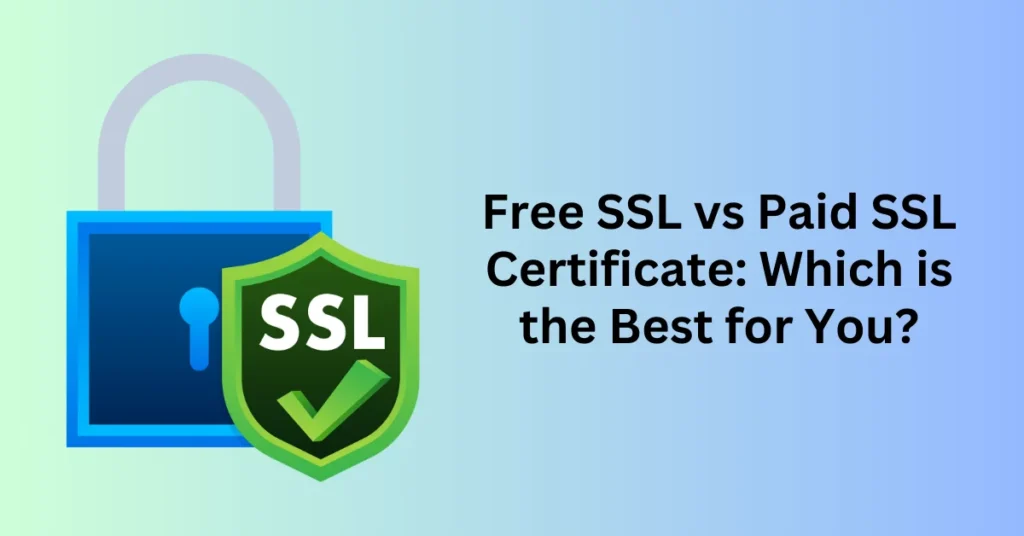SSL (Secure Socket Layer) certificates are essential for websites today. They encrypt all data transmitted between a user’s web browser and the website. This encryption safeguards information from interception or unauthorized access.
Without SSL encryption, sensitive data such as passwords, personal details, and payment information gets sent in plain text. This exposes it to hackers and cybercriminals. Therefore, you should implement an SSL certificate on your website, as it is crucial for protecting both your business and your customers.
In today’s digital landscape, having a certificate is also key to building trust with your website visitors. Browsers now mark websites without SSL as “Not Secure,” which can drive potential customers away. In contrast, websites with SSL certificates display a padlock symbol or “https://” in the URL bar, reassuring visitors that their information is protected.
When deciding on an SSL certificate, you’ll find both free and paid options available online. The choice between these two depends on your website’s security needs, the type of information you handle, and your long-term goals.
Get Free SSL Certificate when You Subscribe to Bluehost Hosting Now
What is an SSL certificate?
An SSL (Secure Sockets Layer) certificate is a vital digital security measure for safeguarding online interactions. It authenticates a website’s identity and encrypts the data exchanged between the site and its visitors. This encryption protects sensitive information, such as passwords, credit card details, and personal data, from unauthorized access or cyberattacks during transmission.

You can easily identify if a website has an SSL certificate by checking the address bar of your web browser. Websites with SSL certificates will have a URL that begins with “https://”, where the ‘s’ stands for “secure.” Additionally, a padlock icon will appear next to the web address, signifying that the connection between your browser and the website is encrypted.
Conversely, websites that do not have SSL certificates will start with “http://” (without the ‘s’). Visiting these sites can trigger a warning from your browser, alerting you that the connection is not secure. Browsers may display a message like “Not Secure” or even block access to the site entirely, warning users of the risks of proceeding without encryption.
Importance of SSL Certificates
SSL certificates are crucial for any website that handles sensitive data, including e-commerce stores, banking sites, and platforms requiring user logins. They protect both website owners and visitors by ensuring that personal information cannot be intercepted by malicious parties.
In today’s digital landscape, data breaches and cyber threats are ever-present. Because of this, SSL certificates are more than just an option; they are a necessity. They protect both users and businesses from potential security risks.
Provide Security
An SSL certificate provides robust end-to-end encryption to protect the information exchanged between visitors and your website. This encryption ensures that sensitive data, such as login credentials, credit card numbers, and personal details, remains secure from hackers and malicious third parties. SSL technology scrambles data while it is in transit. This makes it nearly impossible for unauthorized entities to read or misuse the information. SSL certificates are essential for websites that handle sensitive transactions—such as e-commerce platforms, banking sites, or login portals. They help safeguard user data and prevent potential breaches.
Build Trust
SSL certificates not only secure the technical side of your website but also help build trust with your visitors. A website displaying the padlock icon and using “HTTPS” in the URL immediately signals to users that it is secure. This visual cue is an important factor in customer decision-making. Many online shoppers or visitors will hesitate to interact with a site if they don’t see the padlock or HTTPS, fearing that their data could be exposed to threats. By securing your website with SSL, you instill confidence in your visitors, making them more likely to stay on your site, complete purchases, or sign up for services. This increased trust can lead to higher conversion rates, sales, and long-term customer loyalty.
Improve SEO
In addition to providing security and building trust, SSL certificates also contribute to improving your website’s search engine optimization (SEO). Major search engines, like Google and Bing, prioritize secure websites in their ranking algorithms. This means that websites with SSL certificates—displaying “HTTPS”—are more likely to appear higher in search engine results. Higher rankings can lead to increased visibility, which drives more organic traffic to your site. Therefore, implementing SSL not only protects your site but also enhances its online presence, potentially giving you a competitive edge in attracting new visitors and customers.
Overall, SSL certificates are critical for any website aiming to offer security, build trust with users, and optimize visibility in search engine rankings.
Get Free SSL Certificate when You Subscribe to Bluehost Hosting Now
Pros and Cons of Free SSL vs. Paid SSL Certificates
Pros of a Free SSL Certificate
- Budget-Friendly: Free certificates are ideal for individuals or businesses with limited financial resources, as they don’t require any upfront cost.
- Strong Encryption: Despite being free, these certificates provide the same level of encryption as paid certificates. They ensure secure communication between the website and its users.
- Simple Installation: Many free SSL providers offer an easy, user-friendly installation process. Some even automate it, making it hassle-free for website owners to secure their sites.
- Ideal for Smaller Websites: Free certificates are a good fit for personal blogs, small businesses, and websites that don’t process sensitive information like payments or logins.
Cons of a Free SSL Certificate
- Limited Validation: Free certificates generally only provide domain validation (DV). It confirms domain ownership but not the identity of the website owner or organization. This may be inadequate for businesses that need to build higher trust with their visitors.
- Shorter Lifespan: Free certificates usually have a shorter validity period, often requiring renewal every 90 days. This can be inconvenient for website owners who prefer longer-term solutions.
- No Warranty: Unlike paid certificates, free certificates don’t offer a warranty to cover potential financial losses in case of a security breach.
- Lack of Trust Indicators: Free certificates may lack additional trust features such as site seals, a green address bar, or displaying the organization’s name, which could reduce user confidence in your site’s security.
- Minimal Support: Free SSL providers typically offer limited or no customer support. This makes it challenging to resolve technical issues or troubleshoot problems when they arise.
Pros of a Paid SSL Certificate
- Multiple Levels of Validation: Paid certificates come with various levels of validation, including domain validation (DV), organization validation (OV), and extended validation (EV). OV and EV certificates provide extra verification, displaying the organization’s name in the certificate, which helps build trust with users.
- Warranty Coverage: Paid certificates often come with warranties that protect businesses against financial losses if a data breach occurs due to a flaw in the SSL certificate.
- Longer Validity: Paid certificates generally have longer validity periods (up to 2 years). Hence, reduces the need for frequent renewals and provides more convenience to website owners.
- Dedicated Support: With paid certificates, you typically receive access to dedicated customer support, ensuring that technical issues are addressed promptly.
Cons of a Paid SSL Certificate
- Cost: Depending on the level of validation and features, paid certificates can be costly, which might be a barrier for small businesses or personal website owners.
- Technical Setup: Installing and configuring a paid certificate may require more time and technical knowledge, particularly for advanced certificates like organization validation (OV) or extended validation (EV). For some businesses, this can mean hiring additional technical expertise.
Key Considerations When Choosing Between a Free or Paid SSL Certificate
Whether you’re a blogger, running a personal site, or managing an eCommerce business, selecting the right SSL certificate is crucial for safeguarding your website against cyberattacks and protecting your users’ information. Below are five key factors to consider when choosing between a free or paid SSL certificate.
1. Issuing Authority
The authority that issues your certificate can impact the trustworthiness and reputation of your website. Free certificates are often issued by organizations like Let’s Encrypt, which is a well-regarded, nonprofit certificate authority provided by the Internet Security Research Group (ISRG). Let’s Encrypt is widely used and trusted, offering free certificates for websites of all sizes.
In contrast, paid certificates are issued by authorities like Sectigo (formerly Comodo), which is a global leader in website security and trusted by major companies such as McAfee and Intel. Sectigo provides higher levels of security and validation, making it a more reliable option for larger websites and eCommerce businesses.
2. Validation Type
SSL certificates come in three main validation types, and the choice you make depends on your website’s security needs:
- Domain Validation (DV): Free certificates, like those from Let’s Encrypt, offer Domain Validation. This is the fastest and most basic level of SSL certification, requiring only proof that you own the domain. DV certificates are suitable for personal blogs or small business sites that don’t collect sensitive information like payment details.
- Organization Validation (OV): Paid SSL providers like Sectigo offer Organization Validation, which requires verification of the domain and proof that the organization behind the website is legitimate. OV certificates are more suitable for commercial websites, though they may not be ideal for handling highly sensitive data.
- Extended Validation (EV): Extended Validation certificates offer the highest level of trust and security. They are considered the gold standard for eCommerce and financial websites. These certificates undergo a rigorous vetting process conducted by a human specialist. They also include important details, such as the organization’s name, on the certificate. This added information gives site visitors greater confidence in the legitimacy of your business.
While Let’s Encrypt only provides DV SSL certificates, paid SSL providers like Sectigo offer all three types, allowing you to choose the level of validation that best fits your business needs.
3. Site Seal
All SSL certificates display a padlock icon in the browser, signaling that the site is secure. However, paid SSL certificates come with additional trust indicators like a site seal, which is a visual emblem displayed on your website to reassure visitors that your site is protected by a trusted SSL provider. This site seal can enhance customer trust, leading to increased conversions and sales. Free SSL certificates typically do not offer these seals, which may result in lower perceived trustworthiness from your visitors.
4. Warranty
Free SSL certificates do not include any warranties. This means you won’t have financial protection if your site experiences a data breach or a security flaw in the SSL certificate.
In contrast, paid SSL certificates often come with warranties. These warranties can cover significant financial losses if a security breach occurs due to a flaw in the SSL. For businesses handling sensitive transactions or customer data, this added protection offers peace of mind.
5. Technical Support
Free certificates typically offer limited or no technical support. If you encounter issues during installation or face security-related problems, you’ll need to troubleshoot them on your own. This can be time-consuming and frustrating.
On the other hand, paid SSL certificates provide access to dedicated customer support. If you face any challenges with installation or security, you can rely on expert assistance to quickly resolve issues. This makes paid SSL certificates a more reliable option for businesses or websites that need ongoing technical support.
Final Thoughts: Free SSL vs. Paid SSL Certificate: Which is the Best for You?
When choosing between a free and a paid SSL certificate, it’s important to assess your website’s specific requirements and security needs. Free SSL certificates can be adequate for basic websites, like personal blogs or informational sites, where the risk is lower. They provide fundamental encryption and are a good starting point for those with minimal security concerns.
However, free SSL certificates often lack the advanced features that businesses need when handling sensitive data or processing transactions. If you’re serious about protecting your website and providing a high level of trust for your customers, upgrading to a premium SSL certificate is a wise decision.
Investing in your website’s security today helps protect sensitive data, build consumer trust, and reinforce your brand’s credibility in a competitive online environment.
Get Free SSL Certificate when You Subscribe to Bluehost Hosting Now


